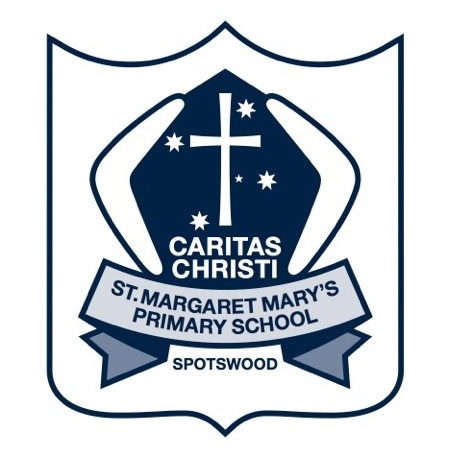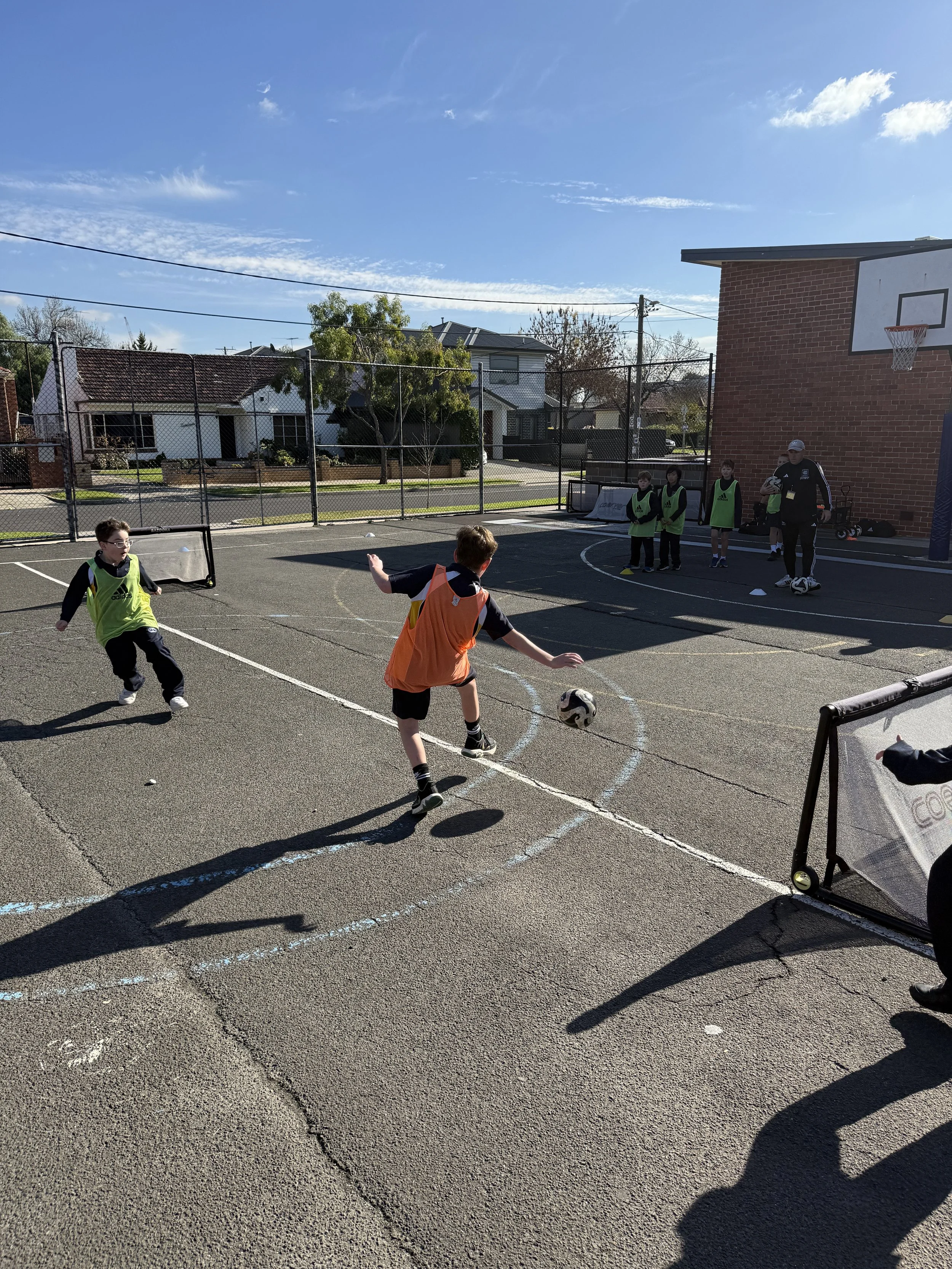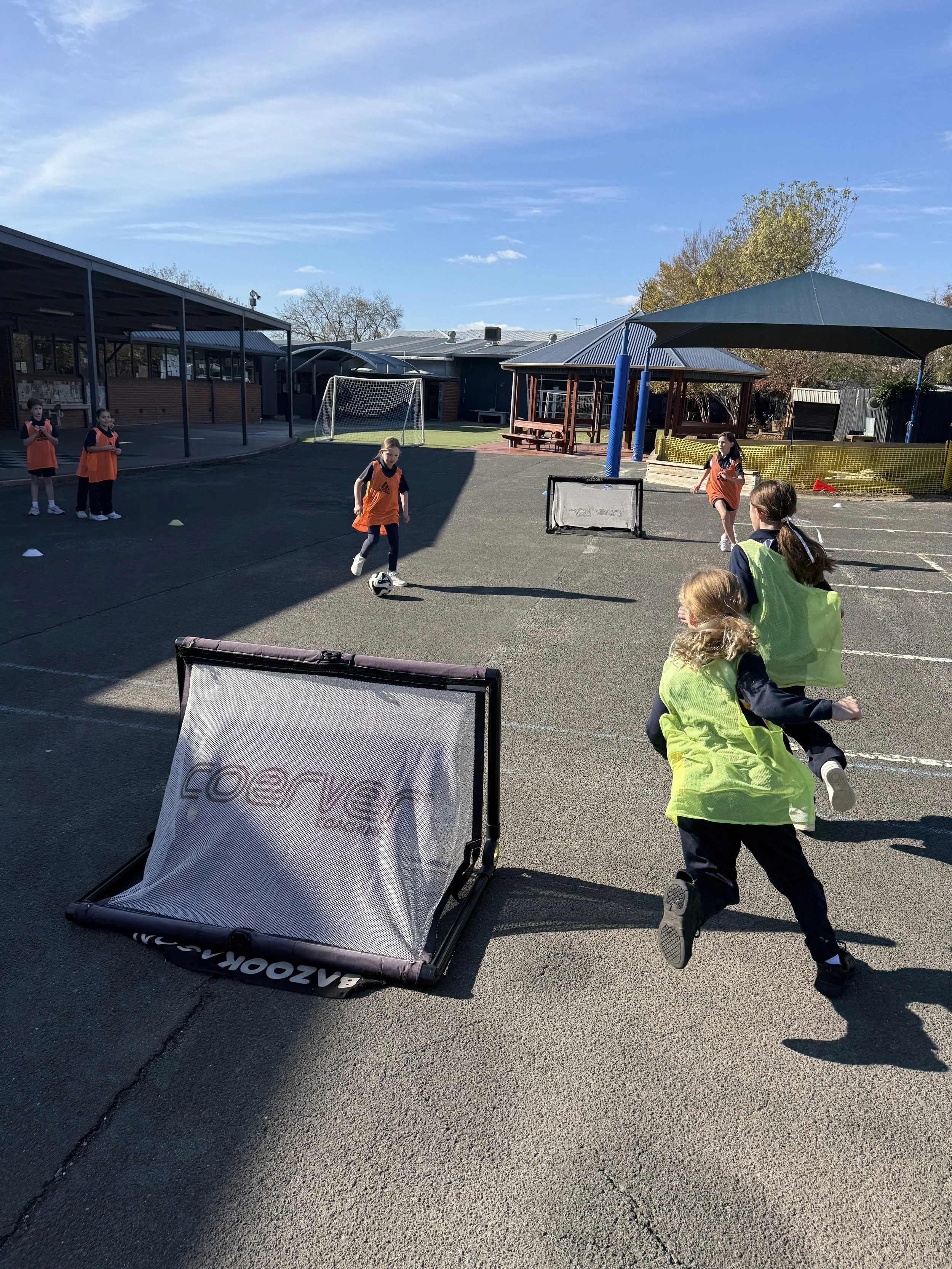Newsletter Term 2, Week 8 2025
Thursday 3 July- Parent Teacher Interviews- Beginning at 12.30pm
Friday 4 July- Last Day of Term 2- Students finish at 1pm
Dear Families and Friends,
“Come, Holy Spirit” – Embracing the Spirit of Pentecost
As we make our way through the season of Pentecost, we’re reminded of the quiet strength and guidance of the Holy Spirit in our lives and in our school. Pentecost is a beautiful invitation to notice where God’s Spirit is at work—renewing us, nudging us forward, and lighting the way. The image of the flame reminds us that we’re called to bring light wherever we go. At St Margaret Mary’s, we see this every day—in the way we learn, support one another, and live out our values as a community.
MACS & SMM Vision for Instruction, Vision for Engagement
Over the past 18 months, St Margaret Mary’s has been actively engaged in the MACS Vision for Instruction. This system-wide commitment to excellence and equity has aligned beautifully with our own focus on high-quality, evidence-based teaching.
By embedding clear, consistent instructional practices and building a knowledge-rich curriculum, we’ve seen our students thrive—growing in confidence, curiosity, and capability.
We now look forward to continuing this journey with the newly launched MACS Vision for Engagement. Unveiled at The Age Education Summit and drawing significant media attention, the launch highlighted the importance of fostering classroom environments where students feel safe, connected, and ready to learn.
As a school that places relationships, routines, and wellbeing at the centre of learning, we’re excited by this next step. Our shared vision remains clear: flourishing learners, in thriving Catholic communities.
School Advisory Council Report
We are incredibly grateful for the dedication and discernment of our School Advisory Council members—Vicki, Charlie, Kelley and Andrew—who continue to offer sound, measured advice with the best interests of our community at heart. Their contributions are thoughtful, collaborative, and grounded in our shared values of Respect, Integrity, Compassion and Excellence.
At last night’s meeting, we were joined by ex-officio member Fr Samuel and Simon Devlin as we discussed recent highlights including the Principal’s pilgrimage, school finances, the FSG’s generous fundraising efforts, and progress on our Master Plan – Stage 2. Thanks to community support, funds are being allocated towards our sandpit upgrade, new library books, a Gaga pit, a data projector, and hall blind installation.
In the coming weeks and next term, there will be opportunities for parent consultation on key topics including the SMM camp program, our school crest design, and the building project. We look forward to your input.
Mid-Year Reports and Conversations
Teachers are currently finalising Semester One reports, which provide a moment in time snapshot of your child’s learning progress. These will be made available to all parents and carers and Parent–Teacher Conversations will follow, held in 10-minute intervals, offering a chance to celebrate progress, discuss learning goals, and work together to support your child’s continued growth. Details about how to book a time will be shared shortly.
Thank you to our staff, families and students for the many ways you contribute to the life of our school.
Stay warm and well!
Colleen McCambridge
Principal
Catholic schools reap the benefits of ‘back to basics’ overhaul
By Caroline Schelle
February 16, 2025
A “back to basics” overhaul on how Victoria’s Catholic schoolchildren learn reading and maths has yielded positive results including an improvement of more than 20 per cent in numeracy skills in the 12 months since the change was brought in.
Melbourne Archdiocese Catholic Schools shifted to explicit instruction for its nearly 300 schools in February last year. The method means teachers introduce concepts and skills that students learn “step by step”, with clear explanations and demonstrations of what they have to learn, including the use of phonics.
It was the largest school system in the country to embed the method into its teaching practice, and came four months before the Victorian government mandated the teaching style for state schools.
According to Melbourne Archdiocese Catholic Schools, there has been an improvement in year 3 numeracy proficiency across its school network.
Data shows a 41 per cent improvement in numeracy skills at St Mary’s College in Seymour after just one year, while other schools have had improvements of at least 17 per cent or higher.
“While still early days, we are already starting to see the green shoots of the systemic changes we are making,” said the organisation’s executive director, Edward Simons.
“Importantly, we are also hearing that our students, their parents and our teachers are enjoying this way of learning,” he said.
The organisation also expects to see additional improvements when NAPLAN results come out later this year.
For the nearly 600 students at Bethany Catholic Primary School in Werribee North, the introduction of explicit instruction has been a game-changer.
Principal Joanne Webster said the improvement in the school’s numeracy and literacy results were “just the start”. The school was an early adopter of phonics and explicit instruction, bringing in programs in 2023.
There was an 13.6 per cent increase in numeracy proficiency, as well as a 17.6 per cent increase in reading proficiency, between 2023 and 2024.
The gaps between students who were struggling and those doing well had decreased since the change, Webster said.
“The method really does provide them with greater support because we’re finding exactly what they need when an issue comes up,” she added.
A child who had gaps in maths or reading could face difficulties as they progressed through the school system, but explicit instruction meant those gaps diminished, she said.
“These gaps in knowledge, that is what’s diminished.”
The principal said more children were also engaged and remembered what they’d learnt, even during the summer break.
“Kids go on school holidays, they’re away for six, seven weeks, and when they come back, they can’t remember what they’ve been taught,” Webster said.
”What we discovered last from December, the year before 2023 to 2024, we didn’t have the so-called a ‘summer slide’,” Webster said.
“Our kids retained their knowledge … it’s really strengthening their working memory.”
Teachers were also more confident because they were seeing improved outcomes for their students, she said.
The improvement in results was not a surprise for Trisha Jha, from the Centre for Independent Studies think tank.
“I’m not surprised at all, and certainly, schools that have moved to this sort of approach have started to see results pretty quickly,” Jha said.
The research fellow said explicit teaching was consistent for all students, and didn’t rely on their background or existing skill level to succeed.
“One of the ‘secrets’ about why explicit teaching works is because it’s based on this idea of thinking carefully on what you want the students to know, and breaking it down into accessible pieces, teaching it explicitly, giving students practice so the opportunity to do a small piece of learning ... and then build on the skill, or build on the knowledge,” she said.
The system-wide change throughout the Melbourne archdiocese schools also meant consistency for students and teachers, Jha added.
The government’s decision last year to also roll out explicit instruction meant students wouldn’t be receiving drastically different quality of education from school to school, whether they were private or public.
“That means that the quality of education starts to become even rather than letting this be a school-based decision, and that means that parents have the confidence that regardless of which primary school they send their kids to, that their kid is going to receive their quality evidence-based instruction,” Jha said.
Playground Mulch – Saturday 14th June, 8:00am–1:00pm
SMM is receiving 20 square meters of mulch, and on Saturday 14th June, we’ll be spreading it across the playground to create a safer, nicer space for our kids. We’ve already got 9 fantastic volunteers signed up – thank you! The more people who come along, the easier and quicker the work will be. Even if you can spare just an hour or two, your help will be greatly appreciated. Please bring your buckets, wheelbarrows, gloves, and shovels and join us for some fresh air, teamwork, and making a real difference. Sign up here: https://volunteersignup.org/PYAH7
Coming Up Soon…
Follow our socials for the latest learning posts from the classroom
St Margaret Mary’s students are independent life-long learners inspired by Gospel values and empowered with a sense of purpose and responsibility. They confidently engage with others and are equipped with skills to adapt to an ever changing world.
Each week, students who embody our values, apply the school mindsets to learning, work hard to improve or persevere to deliver on learning objectives are awarded a class award. Awards will be handed out at our next assembly in week 9 at the earlier time of 2.30. The students who earned an award in the past week are:
Week 8
Week 7
Soccer Fun
A big thank you to Corey and John from Coerver Coaching for coming in and running fantastic technical soccer sessions for our 3rd–6th grade students! Their energy, expertise, and engaging coaching style made the experience both fun and educational for our young athletes. We truly appreciate their time and commitment to helping our students develop their skills and love for the game!
Senior Students’ Garden Planting
Our Grade 5 and 6 students teamed up with our local council rangers, Pete and Allison, today to plant in our front garden beds. They carefully selected local and Indigenous plants that will attract butterflies and pollinators to the area. We’re excited to watch our garden grow and flourish!
Around the Rooms
Foundation
Over the past two weeks, our Prep students have been exploring the concept of community by learning all about the different jobs that help make our world work.
We’ve had a fantastic time discussing a wide range of roles, and we’ve been lucky enough to have several special visitors from our school community come in to speak with us about their jobs. So far, students have had the chance to hear from a police officer, a firefighter, a media and communications specialist, a Metro Trains timetabler, and a flight paramedic. Each visitor shared what their job involves, why it’s important, and answered lots of great questions from curious students.
The children have been incredibly engaged and excited to learn from real people doing these jobs every day. It’s sparked some wonderful conversations and deepened their understanding of how different roles contribute to the community.
We may have even more visitors joining us next week, and we can’t wait to continue this exciting learning journey!
Exciting Learning in Year 1 Green!
It has been a busy and exciting time in Year 1, with plenty of hands-on learning and meaningful experiences across all subject areas! In Faith Life, we have continued our exploration of ‘Community’. Students enjoyed visits from special guests within our local community, and we created a ‘Community Garden’ filled with drawings of ways we can contribute and care for others. In Maths, our focus has been on addition and subtraction. Students are becoming familiar with equation symbols and learning to find the difference between two groups using counters, developing both their problem-solving skills and number sense. In Literacy, we have been building our understanding of suffixes, specifically –s and –ing, and how they change words and meaning. As part of SEL, we have been discussing what it means to be a good sport. Students learnt about fairness, encouragement, and celebrating everyone’s efforts ahead of the Athletics day!
Year 2
We’ve had a busy and exciting fortnight full of literacy learning in Grade 2! Each week includes spelling lessons, reading comprehension, storybooks, grammar, library time, reading groups, and fluency pairs.
We recently finished The Stone Lion, exploring themes like kindness and generosity. Students reflected on the main character’s choices and thought deeply about his motivations. In Under the Southern Cross, we’ve travelled across Australia through the story, made personal text connections, and learned all about the Southern Cross constellation and where it can be seen in the world.
In reading comprehension, we’ve been practising the strategy of visualising. After reading a story about a shark tank, students imagined how the characters felt, then drew their own sharks and described them using adjectives.
Years 3 and 4
The Year 3/4s participated in a Democracy incursion that involved hands-on activities, role-playing, and teamwork. They explored how Australia’s democratic system works and discovered the importance of having a voice in decision-making.
Students took on roles such as councillors, voters, and community leaders, working together to solve real-world challenges, like deciding whether dogs should be allowed off-lead in local parks. Students’ arguments and suggestions surrounding this matter were thoughtful and well reasoned.
Luka – If you have a dog you need to spend the time to train them and be responsible for them.
Maeve - From my personal experiences dogs have never hurt me, so people using parks can relax and feel safe.
Grace S - Perhaps we could have set times during the day where dogs are allowed off leash.
Grace M - If dogs are allowed off leash, we need to make sure that there is a fence that separates them from children’s play areas.
Daniel - Dog owners have to have a permit to let their dog off the leash and if the dog does something wrong when it’s off the leash, they lose their permit.
The incursion sparked lots of lively discussion, critical thinking, and problem-solving. It was a fantastic opportunity for students to deepen their understanding of civics and government.
Some of the students’ reflections about their learning after the incursion were:
Eve - I learned that you can have impact by voting and emailing your local council.
Ben R - I learned that Australians have to vote if they are over 18.
Jasper - I learned that the word democracy is Greek and it actually means ‘people power’.
Rex - I learned that in a council meeting, if there is a tie vote by the councillors, the mayor has to vote to break the tie.
Aurelie - I learned that if there is not an absolute majority of votes, like more than half, then you have to look at the voters’ other preferences.
5/6
Faith Life Inquiry – Term 2: Power, People and Participation
This term in 5/6, our Faith Life Inquiry unit, 'Power, People and Participation,' has focused on civics and government in Australia.
Last week, we were lucky to welcome two presenters from the Parliament of Victoria. They guided us through the process of how a bill becomes a law in Australia by running a mock parliamentary sitting. Students took on different roles and debated the ‘Gambling Advertising Bill,’ learning about parliamentary procedures and the responsibilities of various roles. It was an engaging, hands-on experience that brought our civics learning to life, with plenty of lively debate along the way!
Student Wellbeing/Mental Health in Primary Schools News
Building Stronger Relationships: Reconciliation Through a Sincere Apology
Reconciliation (the process of repairing relationships when things go wrong) is an inherent part of our Catholic school and a vital life skill that students must learn to achieve respectful and fulfilling relationships. Good relationships are essential for a positive learning environment.
Students often learn and mimic the strategies modelled by significant people in their lives. A survey by Raising Children Network revealed that children who regularly witness their parents apologising are 30% more likely to resolve conflicts constructively as they grow older. Modelling respectful behaviour can shape a child's future interactions.
Teaching Children to Apologise to Repair the Relationship
Apologies are about more than just saying "sorry" — they’re a chance for children to practice SEL skills in both self-awareness and social awareness. Learning to apologise builds empathy, responsibility, accountability and positive decision-making with the ultimate aim of repairing relationships. An apology has multiple components children need to learn to make amends for poor choices and recover from the conflict.
1. Help Your Child Understand Other People’s Feelings
Before children can offer a meaningful apology, they must understand how their actions affect others. This starts with understanding and empathy — the ability to see things from someone else’s perspective. At school, students are guided to understand the perspectives of others and to empathise with those who have been harmed.
This skill can be built by asking simple questions, e.g.
If others cheat or are rough in a game how might that make you feel?
When that happened, how do you think they felt?
2. Talk About Owning Our Actions and being Accountable and Responsible
It’s natural for parents to want to defend their child when they come home upset about a disagreement. However, it’s helpful to remember that children often share their perspective first—and may leave out key details. There’s often other sides to the story. It’s proactive to ask open-ended questions like:
What do you think happened from the other person’s point of view?
What might the other person say about it?
Is there something you could have done differently?
A sincere apology means helping children take ownership and responsibility, and recognising when their actions, even if unintentional, have hurt someone else. Rather than just telling a child to say sorry, it’s important to help them think about what happened and to reflect on what led to the poor choice, e.g.
I chose to…because… (focus on actions and words)
In conflict, students can revert to ineffective strategies, e.g. deflecting or blaming. In this instance, children need help to build their self-awareness and reflection skills to understand their role in the problem. Sometimes tone of voice and body language can contribute to the conflict.
For various reasons, children may worry about the consequences of owning up. It helps to explain that owning up to our poor choices is a courageous and mature thing to do and contributes to making amends for any harm they have caused.
3. Think About How to Make Things Right
When a child understands what happened and why it mattered, just saying “I’m sorry” often isn’t enough. What makes a difference is following up with an action or doing something to help.
What could you do to show you care about the person you hurt?
What could you do to show them you want to make it right?
If you were in their place, what would help you feel better?
4. Learn and Grow
Discuss what they can do differently next time. Talk about impulse control, coping strategies or help-seeking. Children need to be able to identify when the conflict is becoming heated and what they can do when they become emotionally reactive, e.g. walk away, seek help from an adult, count to ten, take a deep breath
5. Practice and Lead by Example
As for academic learning, children need good role models and the opportunity to develop the skills involved in apologising. Role-playing and helping children practice apologising with care and meaning is one of the most important tools we can give our children to build respectful, healthy relationships.
In our Catholic context, a sincere apology plays a key role in forgiveness, repair of the relationship and rebuilding of trust. It is a practical way to enact our school values of Respect, Integrity, Compassion and Excellence (RICE)!
WASH YOUR HANDS!
As winter has arrived, proper handwashing remains one of the most effective ways to reduce the spread of germs, prevent illness and avoid absence from school.
How you can work in partnership:
Remind your child to wash their hands before eating and after using the toilet. Explain the steps of handwashing. There are plenty of visuals and fun ways to teach the handwashing steps to children on the internet
Encourage sneezing or coughing into elbows, blowing the nose properly and placing tissues or wipes straight in the bin
Remind children not to share food or drink bottles.
Kids Helpline - Counselling Service for Ages 5 to 25
What it is: Kids Helpline is a national service accessible by phone (1800 55 1800) and online (web chat, email). Free: The service is free to call, even from a mobile phone.
What it offers:
Counselling: Trained counsellors provide support and guidance on various issues.
Confidentiality: All interactions are private and confidential.
Accessibility: Available 24 hours a day, 7 days a week, from anywhere in Australia.
Thanks for working in positive partnership with us to support the children in our care!
Kath Novak
Student Wellbeing / MHiPS
Upcoming Events Next Term
We need your Help!
Dear Families,
We’re excited to announce that the date for our SMM Trivia Night has been set for 16 August, and preparations for this fantastic community event are already underway!
To make the night truly special, we need your support. We kindly ask for donations of the following:
A bottle of wine, spirits, or sweets
Smaller items suitable for raffle prizes
Larger items perfect for our silent auction, such as vouchers, beauty treatments, collectibles, or unique experiences
Donations can be left at the school office by August 11.
Thank you in advance for helping us make this a memorable evening for everyone!
Warm regards,
FSG
🏉Footy Tipping🏉
After two more rounds, we have a new leader! NicJBell has climbed into 1st place, putting together a solid 5 and 6 across Rounds 12 and 13. Team Walsh now trails by a single point, after scoring 5 and 4.
grechster remains steady in 3rd, matching NicJBell's total of 11 over the past two rounds. Collingwood Cal and Hawkspursjnr both added 9 points, while Matt Cram drops slightly after a tough Round 13, picking up just 3 points.
All in all, it is very close with only 4 tips separating 1st and 8th. With so many Jokers to play between now and the end of the season it’s anyone's guess who will win.
Payments made via school FSG bank account, are asked to use your footy tipping alias as a reference. Account SMM FSG BSB: 083 347 Acc: 365426557 You can also send in $25 in an envelope to the office, labeled with your alias and titled "2025 footy tipping".
Cash prizes this year!
1st Prize- $200
2nd Prize- $100
3rd Prize- $50
Supporting Your Child’s Maths Learning – Mental Strategies in Number
Dear Families,
As we approach the time for school reports to go home, we wanted to share a helpful overview of how students learn number skills under the new Victorian Mathematics Curriculum.
The Mental Strategies Developmental Continuum outlines how number knowledge progresses from Foundation to Year 6. Mental strategies are the building blocks of more complex maths thinking. These include skills like visualising numbers, breaking problems into smaller parts, and using strategies that don't rely on counting every time.
To support this learning, all students are now taking part in a short, focused 20-minute daily 'Number Blast' session in class. This regular practice is designed to strengthen their understanding of numbers and improve their confidence in maths.
We hope this information helps you support your child’s number learning at home. Earlier in the term, we also shared with you an online resource, Maths Online, which you can use together to reinforce these strategies.
Thank you for working with us to build strong maths foundations!
Anne Ablinger
Mathematics Leader
Book Club Starting Through Scholastic
The best gift any parent can give a child is the love of books and the joy and benefits of independent reading for fun. Children who read at home, or are read to, have a head start on reading success in school.
Our school is participating in Scholastic Book Club this year. Up to twice a term, during the school year, we will send home a Club catalogue with a different selection of books offered for all ages.
You’ll find award-winning books and bestsellers, as well as old and new favourites. We recommend them because the books span a wide range of children’s reading levels and interests and because they are inexpensive (some books cost as little as $3).
It is easy to order. The Book Club LOOP platform for parents allows you to pay by credit card. Your child’s order is submitted directly to school safe and sound and the books will be delivered to class. You can place your child’s order at scholastic.com.au/LOOP or using the LOOP app, which can be downloaded from the App Store or Google Play. We will not be accepting front office orders this year.
Owning your own books is something special! I hope that you will encourage your child to order books this year. Each order helps earn free books and teaching materials for our classrooms, however there is never any obligation to order.
I know of no better way to encourage reading than to allow children to choose the books they want to read.
Lucy McCarthy
Literacy Leader
Holiday Programs
Guidelines for Keeping Your Child Home When They're Sick
We understand that deciding when to keep your child home from school can be challenging. Here are some guidelines to help ensure your child recovers fully and doesn't spread illness to others:
Fever
If your child has a fever, it's best to keep them at home. Ensure they are fever-free for at least 24 hours without the help of medication before returning to school. At home, you can keep them hydrated and comfortable, which is crucial for their recovery.
Diarrhoea
Diarrhoea can indicate a viral infection. It's important to keep your child at home and provide them with oral rehydrating solutions to prevent dehydration.
Vomiting
If your child has vomited, it's best to keep them at home until they have been vomit-free for 24 hours. This way, they can rest and recover without discomfort, and you can avoid the inconvenience of having to pick them up from school if they are still unwell.
Cough
A serious cough can spread infections and affect your child's sleep and energy levels. If your child has a wet cough, especially with breathing difficulties, please seek medical advice, possibly get a COVID-19 test, and keep them home until they are better.
Rashes
Some skin rashes can be contagious. Have any rash evaluated by a doctor before your child returns to school to ensure it is safe.
Conjunctivitis
This eye infection spreads easily among children. Keep your child home until a doctor confirms they are no longer contagious.
Stomach Ache
Stomach aches can be tricky. If there are no other symptoms like diarrhoea or constipation, and your child is otherwise active, they might be okay to attend school. However, if the pain persists, consider keeping them home and discussing any potential emotional stressors with them.
Ear Infection
Evaluate the severity of your child's symptoms. Mild ear pain might be manageable, but if they are uncomfortable or have a fever, it’s best to keep them at home. Monitor their overall behavior and energy levels to guide your decision.
By following these guidelines, we can ensure our children remain healthy and ready to learn. Thank you for your cooperation and support in keeping our school community well.
Camp Australia
With free public transport for under 18s coming 1 January 2026, let their imagination run free! Create and explore a design for the new Youth myki card and they could win a $1,000* Visa gift card.
All Victorians aged 5 to 17 are invited to design the new Youth myki card!
Whether it’s hand-drawn or digital, we’re looking for original, creative designs that capture the spirit of young Victorians.
Entries close 15 June 2025.
All competition details can be found on the Engage Victoria website.
Salvation Army Donation Drive
St Margaret Mary’s is supporting the Salvation Army in Altona and Hobsons Bay by collecting non-perishable food and household items for local families in need.
Suggested items include tinned food, toiletries, baby care products, long life milk, and pantry staples like pasta, rice, and snacks.
All donations can be brought to school. There's also an option to donate money via the QR code on the flyer.
Thank you for your support.
Emmanuel College Latest News
SPC Unplugged: Lunchtime Vibes in the Library
VET music is a VCE pathway for senior students to learn and practise skills required to become a working musician.
Last week, the Library was anything but quiet as VET music students turned it into a mini concert space for SPC Unplugged — three days of chilled, live acoustic music during lunch.
The audience was graced with solos from:
Liem Phan, an emotionally resonant Cellist
Spencer Bloom, a singer-songwriter with powerful lyrics
Cian Ennis, a future star of the jazz world
In the final two days of the concert series, bands adapted their sound to acoustic sets:
Caustic, a hip-hop and jazz fusion band, delivered dulcet tones on vibraphone and syncopated beats
The Anti-Burns Act, typically energetic punks, gave soulful acoustic covers of punk classics
More VET Music performances are expected at the VET Music Soirée later this year.
Sports News
It has been an exciting and successful term of sport at St Paul’s Campus, with all year levels participating in ACC (Associated Catholic Colleges) AFL and Soccer.
Our Year 10 AFL team has had an outstanding season, currently sitting at the top of the ladder as we head into finals.
Similarly, the Year 9 Soccer team is enjoying a fantastic run, also holding first place in Division 1.
We congratulate Lawson and Ayden in Year 9 for being selected to represent the School Sports Vic U15 All Boys State Netball Team. This marks the first ever school state competition for all boys U15’s netball and is a fantastic achievement to have two students involved.
We are incredibly proud of the sportsmanship and commitment shown by all students – stay tuned for more College sporting highlights.
Information Morning – Saturday 2 August
Come along and learn more about the innovative learning programs and fantastic facilities at Emmanuel College.
Tours will be led by student ambassadors.
Registration and more details: College website
Notre Dame Campus: Saturday 2 August, 9:00am – 11:00am
St Paul’s Campus: Saturday 2 August, 10:30am – 12 noon
Applications for Year 7, 2027 – Close Friday 15 August 2025
If you have a child in Year 5 and would like to apply for Year 7 in 2027 at the Notre Dame or St Paul’s Campus, submit your application by Friday 15 August 2025.
Apply online here
Questions?
Contact: Ms Donna Grech, College Registrar
📞 8325 5100 | ✉️ enrolments@ecmelb.catholic.edu.au
We look forward to welcoming you at a College event soon.
Yours sincerely,
Jenny Hendricks
Community Engagement Officer







































































